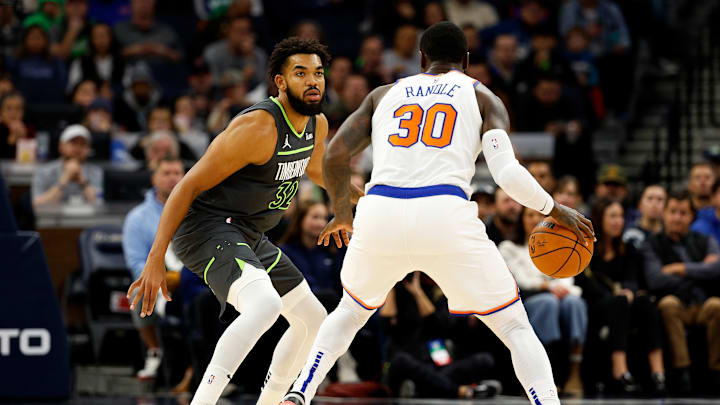There was a 2-for-1 deal going on in Minneapolis on Friday night.
While some whispers and musings saw the Minnesota Timberwolves eventually trading Karl-Anthony Towns, it always seemed unlikely to happen. The nine-year big man had spent his entire career with the Wolves and seemed poised to spend many more. With Minnesota making it to the Western Conference Finals this past season, it was unlikely that they would break up the core that got them there.
Then the unexpected and the seemingly inexplicable happened, as it was announced that he was being moved to the New York Knicks in a shocking trade. Karl-Anthony Towns will be reunited with his old coach in Tom Thibodeau, and have a similar path to competing for titles, just with a different team in a different city.
The experiment of pairing Towns and Rudy Gobert as two centers in the same starting lineup was hardly a failure, but it wasn't the dominant success it needed to be to justify the cost given up for Gobert. In the end, though, it was probably more a financial concern than a production concern that drove them to move on from Towns.
What were the specific details of the trade? Who is coming back to the Timberwolves? Let's take a closer look before we "grade the trade" for the Wolves.
Laying out the trade details
The New York Knicks were deep at every position but center, where last year's starter Isaiah Hartenstein walked in free agency to take a deal larger than the Knicks could offer. Then this past week it was announced that Mitchell Robinson, the presumed starter for this upcoming season, would miss at least the first few months of the season rehabbing from surgery.
That left a mammoth hole at center, especially for a head coach like Tom Thibodeau who loves his traditional center types starting at the 5. They were in line to start the likes of Jericho Sims, or put an undersized Precious Achiuwa into the role.
They instead addressed the position in a massive way, adding All-Star big man Karl-Anthony Towns. In exchange, they sent back Julius Randle, with the idea for Minnesota being that he can step in and approximate most of the role that Towns was providing. That's not fair to how great of a shooter Towns is, but it's not unreasonable to follow that logic. With Randle comes sharpshooting guard Donte DiVincenzo.
Here are the full details of the trade:
Because of the financial situations of both the New York Knicks and the Minnesota Timberwolves, the Charlotte Hornets were recruited into the trade to receive some salary and make the transaction balanced and legal. They will presumably received a second-round pick for their troubles.
For the Knicks, they get a big man in Karl-Anthony Towns who is probably the greatest shooting big man in the history of the franchise. It addresses their need at the five, but losing Donte DiVincenzo thins their backcourt and perimeter shooting. It's also painful to give up on Randle.
What about the Wolves - was this the right move?
Grading the trade for the Wolves
Getting off of Karl-Anthony Towns' contract is worth an A grade in and of itself. He is an immensely talented player, yes, but he is also paid as much as any player in the league and was not a seamless fit with Rudy Gobert. The Wolves were paying over $100 million to three centers, and that was simply not sustainable.
Julius Randle is far from a perfect player; his brand of high-volume, average-efficiency scoring raises the floor but limits the ceiling. He was already starting to settle into a role as the No. 2 alongside Jalen Brunson and can continue that growth track in Minnesota. He is a willing shooter, a bully inside against smaller opponents and a switch defender.
He is also much cheaper than Towns, especially when you consider that the Wolves can either let him walk or re-sign him to a competitive offer. Donte DiVincenzo, on the other hand, is under contract for many years to come at a bargain price and should be an obvious part of the rotation as a gunner and secondary playmaker.
Moving on from Towns also opens up opportunities to reduce salary next summer. Rather than pay to be over the second tax apron, perhaps Gobert restructures his contract and they can duck the second luxury tax apron altogether.
Towns is a better player than Randle, but it may not be significant enough to justify the fit concerns and exorbitant price tag. Splitting him into two high-end rotation players makes a lot of sense.
This deal is hardly a slam dunk, but it makes a lot of sense for the Wolves. It will be fascinating to see how Randle and DiVincenzo fit into this team.
Grade: B+
